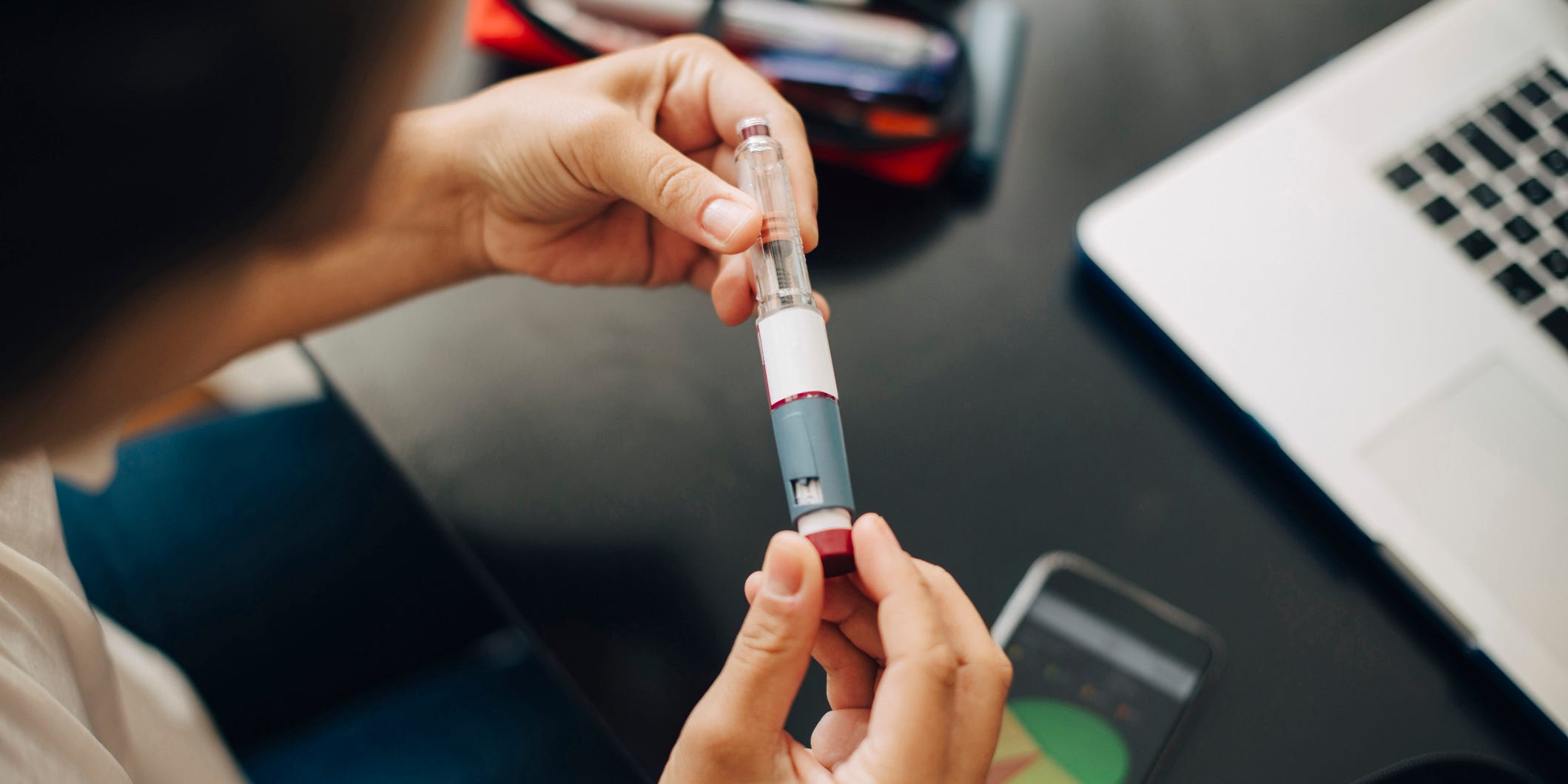
Maskot/Getty Images
- Insulin expires over time because its proteins break down and it becomes less effective at regulating blood sugars.
- Unopened insulin generally expires after one year, but once you open your insulin, it takes about 28 days to expire.
- It’s also important to store insulin properly, as it can expire early, so make sure to keep it refrigerated and away from light or heat.
- This article was reviewed by Jason R. McKnight, MD, MS, a family medicine physician and clinical assistant professor at Texas A&M College of Medicine.
- This story is part of Insider’s guide to Diabetes.
Insulin is a hormone that is produced in the pancreas, and helps signal the body to break down blood sugar for energy. In healthy individuals, the body produces all the insulin that it needs. However, people with diabetes either don’t produce insulin (type 1) or are unable to use insulin effectively (type 2).
As a result, about 24% of people with diabetes need to take insulin. However, this important medication can degrade over time, so it’s important to know when it expires and how to store it properly.
Yes, insulin does expire
Medical insulin breaks down over time, which is why all insulin has an expiration date, says Maria Fernandez de Fiore, RN, a diabetes care and education specialist and Inpatient Diabetes Program Coordinator for Riverside University Health System in Moreno Valley, California.
“The expiration date means that the insulin will start to degrade after this date,” Fernandez de Fiore says. “It will go bad because it won’t be effective to manage blood glucose levels anymore.”
Specifically, this is because insulin proteins break down over time. Expired insulin won't make you sick, but it will be less effective, and it can be dangerous to use.
"When it comes to insulin, we have to make sure it works at its full potency, or the blood glucose levels can go dangerously high," Fernandez de Fiore says.
When does insulin expire?
There are two different expiration dates that insulin users should be aware of. The unopened expiration date is generally one year after the purchase date, and can be found on the box or vial of insulin. That is the date that you can open the insulin and begin using it by.
Once you open a vial of insulin or pen, another expiration date starts. Generally, insulin expires 28 days after it's opened (for a vial or pen), says Fernandez de Fiore, but some pens only last 7 days.
It's important to read all the information on your packaging and speak to your healthcare provider about when your insulin expires after opening it. To help you keep track of the expiration date, it may be helpful to write the date that you opened the insulin on the package or vial.
When you hit either expiration date, any left over insulin should be discarded, says Fernandez de Fiore.
Can expired insulin be harmful?
You shouldn't use expired insulin. "I recommend to never use insulin if it's expired, under any circumstance," Fernandez de Fiore says.
When your doctor prescribes you insulin, they will give you a certain dose and potency. If the insulin has broken down, it will be less potent, and not give you the blood sugar control you need. This could lead to high blood sugar, or hyperglycemia.
There are also a few conditions that can cause insulin to expire early. This can happen if the insulin is not stored properly or has been exposed to room temperature or light, both of which can degrade the insulin.
Before you inject insulin, you should check the insulin's appearance. If you notice any of the following signs, it should be returned to the pharmacy.
- Discoloration or cloudy appearance to regular insulin (which should appear clear)
- Clumps in the insulin
- "Frosting" or crystals on the inside of the vial
In order to make sure that your insulin doesn't go bad before it's expiration, following these storage recommendations, says Fernandez de Fiore.
- Store unopened insulin in the fridge at a temperature between 36 and 46 degrees Fahrenheit
- Store opened insulin that's being used at room temperature, between 56 and 80 degrees Fahrenheit
- Store insulin out of sunlight
- Never freeze insulin or keep it in a hot area, like the glove compartment of a car
Takeaways
Insulin is lifesaving for many people, but in order to work effectively, it should never be used past its expiration date. To reach that date and be fully effective, insulin must be stored properly.
"All insulins are sensitive to temperatures that are too high or too low," Fernandez de Fiore says.
It's not worth the risk to use expired insulin. If your insulin expires and you are unable to afford more, talk to your providers about insulin assistance programs that can help.
Related stories from Health Reference:
- 5 of the best foods to lower blood sugar and manage diabetes
- How to lower your blood sugar quickly and what to do if it's an emergency
- Is diabetes genetic? Both Type 1 and Type 2 are influenced by family history — here's how to know your risk
- How metformin works and why it's effective for type 2 diabetes
- The best exercises to manage diabetes and lower blood sugar
